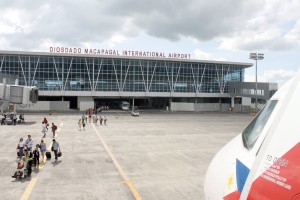
THE REGIONAL Development Council, the highest policy-making body in Central Luzon, sees Clark as an anchor in the synergy for development. Its two other anchors are the Subic seaport and agriculture production. TONETTE T. OREJAS/INQUIRER CENTRAL LUZON
ANGELES CITY—The Partido Abe Kapampangan on Saturday denounced an official of the International Air Transport Association (Iata), saying a foreigner has no right to dictate on the government’s airport policy and strategy.
Tony Tyler, Iata chief executive officer, “lacked expertise to speak on airport development as he is primarily a representative of profit-oriented commercial airlines,” said Alex Cauguiran, Abe Kapampangan president and former executive vice president of the state-owned Clark International Airport Corp.
Tyler had said in reports that the Clark International Airport (CIA) was too far from Metro Manila and that constructing a high-speed train connecting Clark to Metro Manila was costly.
“Indeed, we suspect that Mr. Tyler is just another one of a long line of lackeys of some vested interest groups opposed to the full development of [CIA] as our country’s future premier gateway,” Cauguiran said in a statement.
Abe Kapampangan supports the relocation of the Ninoy Aquino International Airport to the CIA. “[Abe] expresses its strong agreement and solid support to the avowed policy of President Aquino to push forward with the development of [CIA] as the only viable and practical option as the Philippines’ new and modern international gateway,” Cauguiran said.
Tyler, he pointed out, is a “foreigner [who] has no right to dictate [on our President] as to what should be our country’s best airport development policy and strategy.”
He said the recommendations of the Iata official to “make a hub airport for Manila a priority” was a “veiled endorsement” of the plan of the Philippine Airlines to build its own airport near Metro Manila, possibly in Bulacan.
Cauguiran said the viability and practicability of CIA had been confirmed by studies made by Pacific Consultants International in 2005, Korea International Cooperation Agency in 2008, Aecom in 2010 and the Japan International Cooperation Agency (Jica) in 2011.
The Jica study found that of six locations, the CIA “proved to be developable in a relatively short period of time because of its readily available significant land area.”
It recommended that “in order to ensure that the future [CIA] compares well with other Asian gateway airports, there is a need to significantly improve accessibility between CIA and Metro Manila.”
“The disadvantage of its remoteness could be overcome by offering a short travel time between Metro Manila and CIA through a modern airport express rail link,” the study said.
“We believe, just like the findings of Jica, that given the right political will and unity of purpose of our entire national and local government bureaucracy, the full development of [CIA] including the necessary accessibility infrastructure, can be completed within seven years,” Cauguiran said. Tonette Orejas, Inquirer Central Luzon